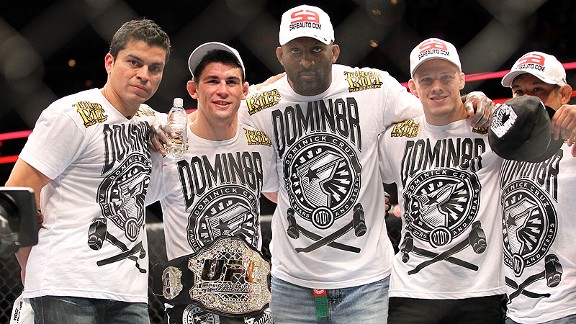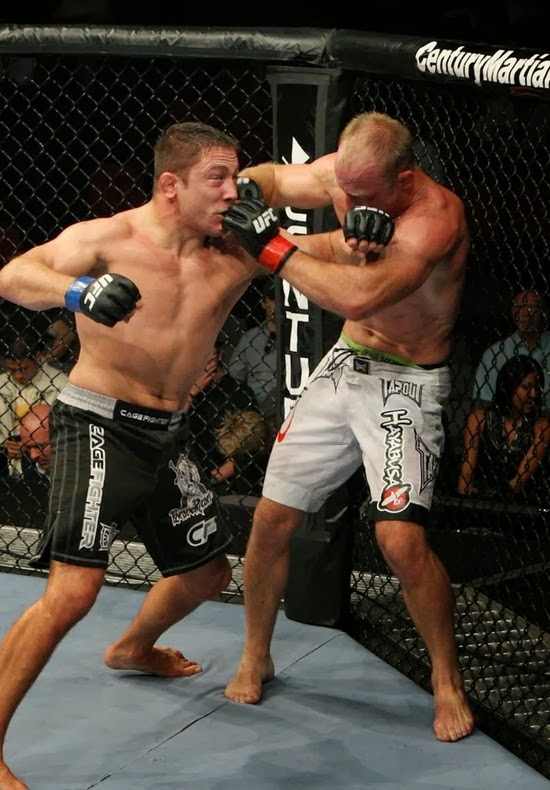With a new season on a new network on the horizon, The Ultimate Fighter is expected to undergo an overhaul. But will the changes go far enough, and reinvigorate the show?
As the UFC’s experience on Spike draws to a close, and its groundbreaking series The Ultimate Fighter has finished its last finale on the network, the promise of a bold new direction on FX looms large. The UFC-Fox partnership begins in 2012, and after getting a taste of it on November 12, there is tremendous cause for optimism. But even still, after 14 seasons, mixed martial arts fans who have soured on TUF might need more reasons to be enthusiastic than you’d think. There is, in fact, a lot of room for improvement.
1. The Coaches
 Rumors are that Bantamweight Champion Dominick Cruz and Urijah Faber are the favorites to coach this season. Their feud is well-documented, and their most recent fight was a fabulous contest. Furthermore, Faber has been a mainstay in the sport for a number of years, and was the face of the World Extreme Cagefighting organization — highly photogenic, well-spoken, and comfortable with the trappings of constant promotion and brand-building. Cruz, however, is a less known commodity, and hasn’t yet connected with MMA fans. Hopefully, a run on the show could help fans decide whether they love or hate him.
Rumors are that Bantamweight Champion Dominick Cruz and Urijah Faber are the favorites to coach this season. Their feud is well-documented, and their most recent fight was a fabulous contest. Furthermore, Faber has been a mainstay in the sport for a number of years, and was the face of the World Extreme Cagefighting organization — highly photogenic, well-spoken, and comfortable with the trappings of constant promotion and brand-building. Cruz, however, is a less known commodity, and hasn’t yet connected with MMA fans. Hopefully, a run on the show could help fans decide whether they love or hate him.
Like many seasons before it, the fight between the coaches, is likely to take place on PPV, presumably a week or so after the airing of the Finale. Unlike other seasons, though, the nearly live nature of the show means that the bulk of the coaches’ preparation for their fight will coincide with the progression of the show, and its taping schedule. To that end, this new format offers the opportunity to show coaches training alongside their fighters, with the possibility of deeper bonds being formed, and deeper betrayals looming.
Because this most recent season featured Bantamweights and Featherweights, it is unlikely that these coaches will train alongside fighters at or near their weight class, but hopefully Zuffa recognizes that Lightweight is a division that is rich in talented prospects who wouldn’t dwarf their respective coaches. There would obviously be a tension between coaching teams preparing the prospects for their fights, and them also preparing the TUF coaches for a decidedly higher-stakes contest. However, the viewer watching at home can get a closer look at more of a training camp setting, rather than the single fighter-focused format that Countdown shows and 24/7 has traditionally embraced. If done effectively, not only will Faber and Cruz be bigger stars, but also will their coaches and training partners.
2. The Fighters
 First off, it’s important to understand what it means to be a “TUF Champion,” rather than simply a “TUF Alum.” To date, very few winners have been cut from the organization, and most have received favorable matchmaking, designed to maximize exposure, while aid in their development. What this means, then, is that a TUF Champion gains exposure, job security, and the opportunity to be developed as a prospect while being somewhat protected. In many ways, this is like being a #1 draft pick in a “stick and ball” sport. The TUF Alumni, however, cannot be guaranteed the same degree of shepherding, but each is afforded greater exposure than your average entry-level fighter, and may emerge from the UFC crucible as a star in his own right. In that fashion, they are like conventional draft picks, with a combination of blue chippers, busts, “projects,” and diamonds in the rough.
First off, it’s important to understand what it means to be a “TUF Champion,” rather than simply a “TUF Alum.” To date, very few winners have been cut from the organization, and most have received favorable matchmaking, designed to maximize exposure, while aid in their development. What this means, then, is that a TUF Champion gains exposure, job security, and the opportunity to be developed as a prospect while being somewhat protected. In many ways, this is like being a #1 draft pick in a “stick and ball” sport. The TUF Alumni, however, cannot be guaranteed the same degree of shepherding, but each is afforded greater exposure than your average entry-level fighter, and may emerge from the UFC crucible as a star in his own right. In that fashion, they are like conventional draft picks, with a combination of blue chippers, busts, “projects,” and diamonds in the rough.
So why not make the situation more explicit and transparent? Hardcore fans of every sport are drawn to Drafts, because they represent an opportunity to add new blood to a League, depth to divisions, and intriguing prospects that could shake up the entire sport. Do we believe that the next Jon Jones, Jose Aldo, Frankie Edgar, or Georges St. Pierre will come through the TUF system? No, but we should. While the PRIDE and Strikeforce acquisitions restocked divisions and redefined what it means to be a UFC Star, it is likely that, going forward, in order for the company to truly put their stamp on its talent acquisitions, the TUF program and Fight Night series will loom larger. Fighters introduced to audiences through the reality show, and featured recurrently on basic cable for free, will have an inherent advantage over fighters who debut on PPV undercards, and receive sporadic and inconsistent exposure to the masses, even if those fighters are more promising talentwise. Consider the case of Jon Jones, who put on star-making performances that were overlooked by all but the hardest hardcores, while Krystof Sozynski and Ryan Bader had the spotlight shone brightly upon them, which induced apathy among casual fans. Who knows how much bigger Jones would have been if he had shown up on casual fans’ collective radar sooner?
 Another prominent example of this can be illustrated when you contrast the respective UFC careers of Roy Nelson and Ben Rothwell, who signed with the organization around the same time. However, Rothwell went directly onto PPV undercards, while Nelson joined the 10th season of TUF. After being exposed to fans over a sustained period, and having his story told, “The Big Fat dude who beat Kimbo Slice” was introduced to more eyeballs, and even managed to craft a bit of a narrative around his “feud” with Dana White. It’s no McMahon vs. Austin (or even Dana vs, Tito), but don’t sleep on the notion that there are some people who like the guy who rubs the Boss the wrong way, but is too good to care. Just as Kimbo Slice was compelling as the dude that needed to impress on TUF to get a UFC shot, so too did Nelson have to win it all to overcome the idea that fat men were not welcome in the Octagon.
Another prominent example of this can be illustrated when you contrast the respective UFC careers of Roy Nelson and Ben Rothwell, who signed with the organization around the same time. However, Rothwell went directly onto PPV undercards, while Nelson joined the 10th season of TUF. After being exposed to fans over a sustained period, and having his story told, “The Big Fat dude who beat Kimbo Slice” was introduced to more eyeballs, and even managed to craft a bit of a narrative around his “feud” with Dana White. It’s no McMahon vs. Austin (or even Dana vs, Tito), but don’t sleep on the notion that there are some people who like the guy who rubs the Boss the wrong way, but is too good to care. Just as Kimbo Slice was compelling as the dude that needed to impress on TUF to get a UFC shot, so too did Nelson have to win it all to overcome the idea that fat men were not welcome in the Octagon.
The Ultimate Fighter thrives when it’s telling those kinds of stories, of a fighter trying to achieve something in victory that he won’t receive just by being there. We recognize now that about half of the guys have already “made it” just by making it to the show, and unless they screw up badly, by quitting, fighting in the house, missing weight, or otherwise acting a fool, they’re in the door. So it follows that shows involving quitting, fighting in the house, missing weight, or acting a fool get highlighted, but not the fights. To change that, there needs to be a return to the central premise of the show: 16 men competing to be The Next Ultimate Fighter.
Simply put, each season is a single-elimination tournament (or two), and the prize is the coveted “six figure contract,” along with a vague title. But to casual fans, the title is meaningless, and in a landscape where professional athletes and reality show winners earn a million dollars or more, “six figures” (especially dispersed over multiple fights) seems like chump change. But imagine that the TUF Championship is worth (up to) $1,000,000. This could be 5 fights with a guarantee of $25K per, with a potential 5 fight rollover at $50K guaranteed, and potential PPV points, in an incentive-laden deal, but the important thing is that (up to) a million is at stake. Why? Because (up to) a million dollars for a tournament winner feels right. Because whatever another fighter earns, the inherent lack of job security makes him less attractive to sponsors than a fighter guaranteed 5-10 fights in the UFC, in prominent spots on cards. And most importantly, because a higher prize attracts better talent, guys who might feel that they’re too good for a reality show.
And better talent is key. TUF should be the UFC’s version of the Draft. At the same time each year, the company’s new acquisitions should sign, and the top guys should be competing for the (up to a) Million Dollar Contract. While I’m sure that a few true neophytes will still make the show, the vast majority of the entrants will be somewhat-polished prospects, which should lead to better, more exciting fights.
3. The Fights
 Speaking of the fights, it has already been announced that FX will be presenting a format that features live fights weekly, so those fans who might otherwise be less than enticed by “stale” fights will be engaged by the idea that every Friday night, there will be a live elimination. Furthermore, fans will be choosing the match-ups, and this interactive element will also make the fights more appealing, even if it eliminates one of the elements of strategy that have traditionally been employed across seasons of the show.
Speaking of the fights, it has already been announced that FX will be presenting a format that features live fights weekly, so those fans who might otherwise be less than enticed by “stale” fights will be engaged by the idea that every Friday night, there will be a live elimination. Furthermore, fans will be choosing the match-ups, and this interactive element will also make the fights more appealing, even if it eliminates one of the elements of strategy that have traditionally been employed across seasons of the show.
However, one factor that has not been announced is whether the live fights will take place in the UFC Training Center, where only the fighters and coaches will be watching the fights, or whether these live fights will take place in an actual arena, with fans present. If FX is truly interested in capturing the atmosphere of a live sporting event, it and the UFC should seek out a venue that could host weekly TUF events on Friday nights, and let rabid fans join in on the experience. WEC and Strikeforce Challengers events have been able to use smaller venues to host lower-profile events, and so too could the “TUF Series” be the kind of event that can fill this niche. While the FX telecast will be showcasing the single fight from The Ultimate Fighter, preliminary contests featuring lower-end TUF alumni, or prospects in need of longer seasoning cycles, could be aired before and/or after The Ultimate Fighter on Fuel, as part of pre- and/or post-show coverage. For the fighters and hardcore fans, this would be one step closer to weekly UFC fight cards, but casual fans could just focus on the showcased TUF fights, yet while absorbing the atmosphere and ambiance of fights taking place in front of live crowds.
And that is a crucial distinction: As compared to other seasons of TUF, these are real fights, and they count against the fighters’ professional and UFC records. While admittedly the TUF Series represents a lower tier of UFC competition, it will hopefully serve to elevate the caliber of fights that take place on other UFC tiers.
4. The House Drama
 The “Big Brother” reality franchise is based on the idea that isolation and surveillance is itself a gauntlet to be endured, and it can present fascinating television. Presumably, like that show, the Ultimate Fighter house, with its sequestration of its fighters from the relaxation and creature comforts of friends, family, and familiarity, should make these fighters more edgy and crazy, but in truth, the show has never done a good job of capturing that atmosphere, rather than having the fighters merely talk about it. “Show, don’t tell” is a crucial rule of thumb, and the show often fails in this regard.
The “Big Brother” reality franchise is based on the idea that isolation and surveillance is itself a gauntlet to be endured, and it can present fascinating television. Presumably, like that show, the Ultimate Fighter house, with its sequestration of its fighters from the relaxation and creature comforts of friends, family, and familiarity, should make these fighters more edgy and crazy, but in truth, the show has never done a good job of capturing that atmosphere, rather than having the fighters merely talk about it. “Show, don’t tell” is a crucial rule of thumb, and the show often fails in this regard.
 24/7 surveillance should induce paranoia, while allowing viewers the voyeuristic thrills that they crave. Since viewers will be essentially determining the eliminations based on what they see in the house and in training montages, there is no reason that viewers who choose to be even more engaged by what takes place in the house shouldn’t have this higher level of engagement rewarded. Much like Big Brother offers a premium “After Dark” feed, the TUF House too could allow viewers to peek in on the fighters at any point in the day, which would create additional incentives for fighters to be even more entertaining or antagonizing in the house, as eyes will always be on them.
24/7 surveillance should induce paranoia, while allowing viewers the voyeuristic thrills that they crave. Since viewers will be essentially determining the eliminations based on what they see in the house and in training montages, there is no reason that viewers who choose to be even more engaged by what takes place in the house shouldn’t have this higher level of engagement rewarded. Much like Big Brother offers a premium “After Dark” feed, the TUF House too could allow viewers to peek in on the fighters at any point in the day, which would create additional incentives for fighters to be even more entertaining or antagonizing in the house, as eyes will always be on them.
Also, the fact that the fighters lack media — such as books, music, movies, and television — isn’t played up enough. This could be played for drama, while also represent a tremendous opportunitity for the show’s producers to introduce product placement opportunities. What if a winning team got an hour of recreation time with the new HTC Rezound? What if a fighter who got a particularly thrilling win got to video chat with his spouse or girlfriend using the Samsung Galaxy Tab 10.1? What if, in addition to a coaching challenge, a UFC Undisputed video game tournament was organized? The fighters themselves would relish this access to media sources, and the viewing audience would be exposed to the kind of in-show advertising that sponsors would pay top dollar for.
 And as previously mentioned, the fact that some fighters would be earning privileges would create more catalysts for conflict, which show producers are sure to covet.
And as previously mentioned, the fact that some fighters would be earning privileges would create more catalysts for conflict, which show producers are sure to covet.
In the end, the fact that the show will be airing on a new network doesn’t mean that by itself the staleness of the format will be resolved. Yes, the new format will pique the interest of fans, and yes, we can expect a ratings spike on FX. But ensuring the success of the show long-term requires a reimagining and a reinvention of what the UFC’s flagship reality program represents. These are a few ideas, and we MMA fans can only hope that the braintrust at both Zuffa anf Fox are thinking outside of the figurative and octagonal box, in order to restore the relevance of the Ultimate Fighter program, and maintain it long into the future.




